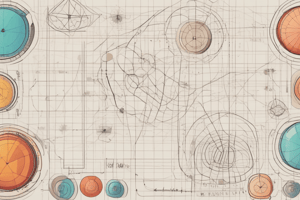Podcast
Questions and Answers
What branch of mathematics is used in medicine for diagnosing diseases?
What branch of mathematics is used in medicine for diagnosing diseases?
- Calculus
- Linear algebra
- Geometry
- Probability theory (correct)
In the field of nutrition, what mathematical concept involves understanding ratios between different nutrients?
In the field of nutrition, what mathematical concept involves understanding ratios between different nutrients?
- Statistics
- Linear algebra
- Algebraic equations (correct)
- Calculus
Which mathematical concept is crucial in sports for determining peak performance timings during training sessions?
Which mathematical concept is crucial in sports for determining peak performance timings during training sessions?
- Linear algebra
- Calculus (correct)
- Probability theory
- Statistics
Which area of finance relies on data analysis using branches like linear algebra and statistics to make investment decisions?
Which area of finance relies on data analysis using branches like linear algebra and statistics to make investment decisions?
What geometry principle is frequently referred to by economists when analyzing markets?
What geometry principle is frequently referred to by economists when analyzing markets?
Why do governments utilize abstract economic concepts like supply vs demand curves in regulating industries?
Why do governments utilize abstract economic concepts like supply vs demand curves in regulating industries?
What type of functions do engineers typically work with when building bridges?
What type of functions do engineers typically work with when building bridges?
Why is high proficiency in Mathematics essential for careers related to technology-based projects?
Why is high proficiency in Mathematics essential for careers related to technology-based projects?
In environmental science, what role do basic arithmetic operations play in climate change studies?
In environmental science, what role do basic arithmetic operations play in climate change studies?
Why is it mentioned that people frequently resort to mental calculations involving basic arithmetic operations in everyday life situations?
Why is it mentioned that people frequently resort to mental calculations involving basic arithmetic operations in everyday life situations?
Which field involves understanding pollution rates depending on population density?
Which field involves understanding pollution rates depending on population density?
Where can mathematics be found according to the text?
Where can mathematics be found according to the text?
Flashcards are hidden until you start studying
Study Notes
Math is Everywhere!
Math may seem like a dry subject, confined within textbooks and classrooms, but it's actually all around us, playing vital roles in our lives without most of us even realizing it. From understanding how our body works to grasping complex ideas, math provides insights into the world that surrounds us every day. Here are some key areas where math touches upon our daily lives:
Health
Many health sciences are deeply mathematical. For instance, medicine relies on probability theory when diagnosing diseases, epidemiology uses statistics to track disease spread, while nutrition requires understanding ratios between different nutrients. Even something as simple as measuring blood pressure involves algebraic equations. In sports too, timing plays a huge role - athletes need to know exactly when they have reached their peak performance during training sessions which can only be determined by using mathematics.
Economy & Finance
Finance professionals utilize many branches including linear algebra, calculus, and statistics to make investment decisions based on patterns observed over time through data analysis. Similarly, economists often refer back to core principles from geometry such as supply vs demand curves when analyzing markets. These abstract concepts help governments regulate industries according to set rules, effectively preventing economic booms followed by busts we might otherwise see if these principles were ignored.
Technology
When building bridges, engineers typically work with polynomials and other types of complicated functions that allow them to predict how structures will behave under various stresses before any actual construction takes place. Computing machines rely heavily on algorithms - sets of instructions written in code formulated mathematically. Both examples illustrate why high levels of proficiency in Mathematics are considered essential for careers dealing directly or indirectly with technology-based projects.
Environment
Environmental science incorporates several aspects of mathematics ranging from chemistry to physics; students studying this field must have solid foundations across multiple subjects. One example includes environmental modeling techniques used in climate change studies where basic arithmetic operations play important roles. Another application could involve understanding pollution rates depending on population density—a straightforward multiplication problem.
In everyday life situations, people frequently resort to mental calculations involving addition, subtraction, multiplications, divisions etc.. Of course there are times when we inevitably lose focus due to distractions but generally speaking having knowledge regarding fundamentals makes individuals more efficient thinkers capable of solving practical problems quickly and accurately.
Mathematics isn't just limited to these examples though...it continues being central everywhere we look—from astronomy describing cosmic phenomena down to microbiology exploring smallest units of living organisms. So remember next time you think math seems irrelevant because 'real' life doesn't require algebra or trigonometry: remember how much hidden beauty lies beneath surface appearances waiting patiently for discovery made possible via deeper understanding achieved through mastery over specific mathematical concept(s) involved.
Studying That Suits You
Use AI to generate personalized quizzes and flashcards to suit your learning preferences.




